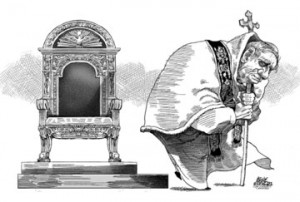
In the Philippine realm, his exit also provides a concrete example of letting go of power in order to let others serve. With this rare resignation, Fr. Emy Maningo C.Ss.R sees its value in the stubborn hold that political dynasties have in society, a pattern reinforced in each election.
We join him in believing that change can start to happen, no matter how long it takes, with a single, mighty act of sacrifice.
Here’s what the Cebu Redemptorist priest sees in his reflection of the pontiff’s decision:
When Pope Benedict XVI received the power of the “Keys of St. Peter,” he knew that this power was to be used for service. Jesus reminded him, “I came to serve, not to be served.”
I have absolutely no doubt that Pope Benedict XVI tried his best to serve with sincerity. Of course, as a human being, he had his share of gifts and limitations. But, he could never be faulted for lack of sincerity. Therefore, when he knew that he could no longer serve effectively because of his deteriorating health, he did not cling to power. He gives it up, in order to make room for other Papal instruments of the Lord.
I pray that our political dynasties look up to our Pope as their role model. The “yin and yang” of Eastern thought tells us that every reality is a mixture of lights and shadows. Jesus calls it the unavoidable mixture of the “the weeds and the wheat” in one’s farm. Of course, political dynasties claim to serve the people. However, if they are really honest, political power also enables them to serve the economic welfare, fame and other self-interests of their clan. The question has to be, “Which is the greater – service of the clan, or service of the people?”
When can a political dynasty honestly say that their clan has already done enough to serve the people and themselves; and allow other families to serve? If so, when are they ready to give up political power? I do not buy their argument that the people be allowed to decide whether they still want their family or not. Until we have a broad enough middle class that is economically independent, there can be no real freedom to vote. Nobody expects the sakadas of Negros’ sugar cane haciendas to vote “freely.” They have to vote for their amo and their amo’s candidates – or they lose their jobs. We have the trappings of “democratic elections,” but without the infrastructure of “economic democracy.” We will not have a majority who are economically free to vote until the booming economic growth is shared equitably by the majority who are still poor.
The same questions above have to be proposed to all civic and religious leaders. Yes, even we who are priests, religious and lay leaders of the Church have to reflect along the same lines mentioned above. The same is required of civic leaders, NGOs, media, business, entertainment, etc.
For now, we zero in on political dynasties as we enter election time again. We, as Filipino citizens and Christians, need to take effective action so that the next Congress will eventually pass a law to enable the implementation of the 1987 Philippine Constitution provision on the abolition of political dynasties. Of course, political dynasties will not legislate themselves out of power. We must push them. Can this be our collective penitential act for for Lent?
There is a saying that goes like this, “Never presume, always check.” Check the performance, not the verbal assertions. Shakespeare said, “He doth protest too much.” When someone makes too many declarations of using power for service, watch out!